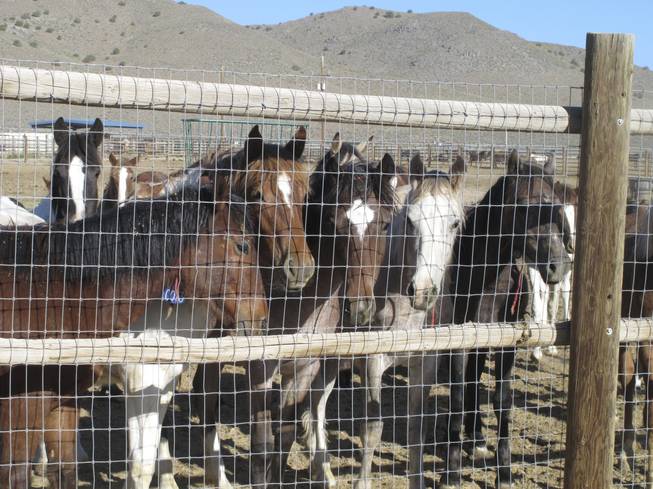
Scott Sonner / AP
In this June 5, 2013, photo, some of the hundreds of mustangs the Bureau of Land Management removed from federal rangeland peer at visitors at the a holding facility about 20 miles north of Reno in Palomino Valley.
Tuesday, Oct. 31, 2023 | 2 a.m.
Nevada ranchers are suing the federal government for not rounding up the proliferative wild horses that roam on the same lands where their cattle graze outside of Tonopah.
Colvin & Son LLC and Stone Cabin Ranch LLC sued the Bureau of Land Management, along with its parent agency, the U.S. Department of the Interior, on Oct. 17 in U.S. District Court in Nevada over the wild horse overpopulation in a 540,000-acre swath of land within an area that the government calls the Stone Cabin Complex.
The ranchers argue that despite the BLM determining earlier this year that the area needs land managers to remove hundreds of mustangs and give female horses fertility control vaccines over the next 10 years to keep the population at a level that the rangeland can support, the government has yet to begin rounding up the animals. And that, the lawsuit alleges, violates the federal Wild and Free-Roaming Horses & Burros Act, which has guided management of feral horses and burros on public lands for more than 50 years.
The federal government permits Colvin & Son and Stone Cabin Ranch to graze livestock on the public land of the Stone Cabin Complex, which is about 15 miles east of Tonopah. The family that owns Stone Cabin Ranch has had livestock operations in Nevada since 1883, the complaint said.
The Bureau of Land Management estimates that the land in question can support 242-404 horses, according to an April environmental assessment of the land complex. It had more than 900 mustangs on the land as of last fall, the assessment estimated — leading the BLM to conclude that horses needed to be removed.
But the assessment conditioned the removals on off-range corral space availability and “funding limitations and competing national priorities.” The ranchers said this was not allowed under the Wild and Free-Roaming Horses & Burros Act, which says that excess animals must be removed immediately.
The ranchers sued after the Department of the Interior rejected their appeal challenging the proposed roundup’s deferral.
The “lack of implementation” of the roundup decision violates the Wild and Free-Roaming Horses & Burros Act, “causing harm to the plaintiffs, to the public lands within the (Stone Cabin Complex), to wildlife species and their habitats, and to the wild horses themselves,” the lawsuit states.
The BLM routinely gathers wild horses and burros from the range in the Western U.S., especially in Nevada, to maintain ecological balance. Removed animals may be offered to the public for adoption or sale. Animals that are not adopted are cared for on open pastures for the rest of their lives.
The animals — which are the offspring of long-ago escaped or turned-out mining and ranch animals — compete with native wildlife and privately owned domestic livestock for food and water that is often limited by drought.
The environmental assessment for the Stone Cabin Complex shows that, if left unchecked, the mustang population could increase at a rate of about 14-23% per year. This could drive the population up to more than 1,100 horses within three years, or nearly three times what the land is thought to be able to handle.
The last roundup in the Stone Cabin Complex area took place in 2021, when the agency collected 314 mustangs by baiting them into a trap with water. The BLM said the 2021 roundup was to reduce the risk of starvation and dehydration.
Colvin & Son also filed suit in May claiming a similar alleged roundup delay around where they graze cattle in a nearby area known as the Little Fish Lake Joint Management Area. The Little Fish Lake area is about 60 miles northeast of Tonopah.
As of 2022, the Little Fish Lake area had 323 wild horses but can only support 24-39 on the 28,744 acres managed by the BLM, according to that suit.
The Little Fish Lake case is also pending.
